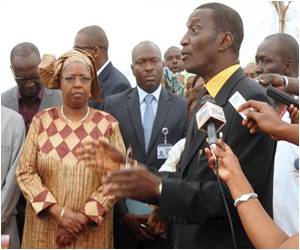Top US health officials went for a grilling on Thursday by lawmakers, who were infuriated over the nation's fumbling response to the Ebola outbreak.

Some lawmakers have demanded Frieden's resignation and others have accused President Barack Obama of a lack of leadership, while congressional leaders urge a travel ban to the United States on everyone from West Africa's three Ebola-hit nations: Guinea, Liberia and Sierra Leone.
"I'd like to see the president use executive powers to begin to restrict travel. That's the key," Tim Murphy, who chairs the House Energy and Commerce Subcommittee on Oversight, which is holding Thursday's hearing, told CNN.
Other lawmakers including House Speaker John Boehner and Senator Marco Rubio urged the president to consider such a ban, although some experts warned that isolating West Africa could further strain its health-care resources.
Frieden stood his ground in prepared testimony to the panel, and pledged a "whole-of-government response" to keep the hemorrhagic virus at bay in America.
"We remain confident that Ebola is not a significant public health threat to the United States," Frieden will tell the panel.
Advertisement
That is little consolation to worried lawmakers.
"The stakes could not be any higher, and as I have said before, we cannot afford to look back at this point in history and say we could have done more."
More than 4,490 people are known to have died from Ebola in West Africa, although Frieden said "these numbers may be substantially under-reported."
"There is no room for error," added Murphy.
But mistakes in handling Ebola continued to crop up in the United States after the Liberian patient, Thomas Duncan, was cared for in Texas.
"Unfortunately, in our initial treatment of Mr Duncan, despite our best intentions and a highly skilled medical team, we made mistakes," Dr. Daniel Varga, chief clinical officer of Texas Health Resources which runs the hospital where Duncan was treated, testified.
- Hospital 'never talked about Ebola' -
A nurse who treated one of the health workers who tested positive for Ebola accused Texas Health Presbyterian Hospital of failing to adequately prepare staff for handling Ebola cases prior to Duncan's arrival.
"We never talked about Ebola and we probably should have," nurse Brianna Aguirre told NBC's "Today" show.
"They gave us an optional seminar to go to. Just informational, not hands on," she added. "We were never told what to look for."
Compounding concerns, the CDC allowed a health care worker who had been exposed to an Ebola patient to fly by commercial plane after she reported a low-grade fever.
Officials are now considering a travel ban in such cases, a source told AFP.
US authorities began screening for Ebola Thursday at Northern Virginia's Dulles, Chicago's O'Hare, Newark and Atlanta airports, after New York's JFK began screening last week.
Together the airports receive 94 percent of travelers from the Ebola-affected countries.
Frieden said the two US transmissions showed the need for authorities "to strengthen the procedures for infection-control protocols."
"It's like fighting a forest fire: leave behind one burning ember, one case undetected, and the epidemic could re-ignite," he said.
Anthony Fauci, director of the National Institute of Allergy and Infectious Diseases, said work on an Ebola vaccine has shown promise, with results of some clinical trials anticipated by the end of 2014 and more clinical testing next year.
Source-AFP











